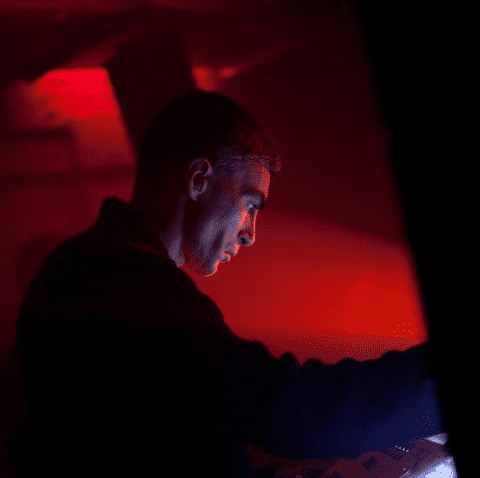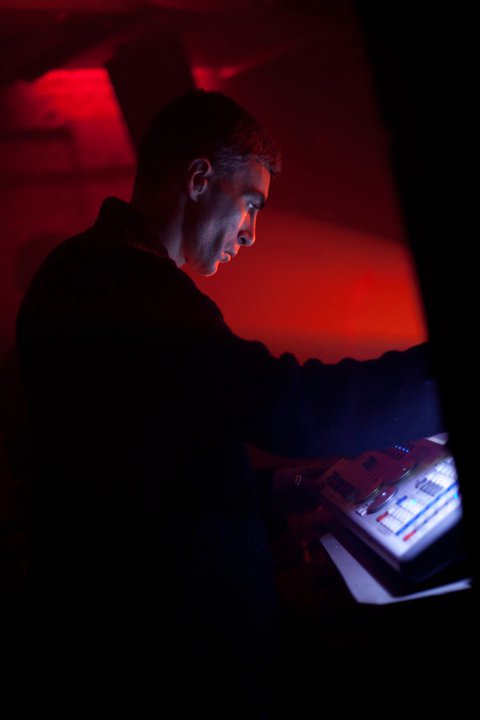More accustomed to controlling the spotlight than being in it, Chris Binks has been at the helm of the Fabric lighting desk since the club first opened its doors in 1999. In this exclusive interview he shines a light (sorry!) on what it takes to do the job.
Name
Chris Binks
Place of work
Fabric, London
Job
Lighting Designer
How long have you had the job?
I’ve been at Fabric for twelve years and I believe I’m the longest serving member of staff at the club.
Describe a typical day.
During the week I have two maintenance days which run from 11am until 7pm. On those days I take care of any repairs to the rigs across all three rooms, checking that they’re all positioned correctly and working to their full potential. I’ll also meet with various suppliers and manufacturers to discuss any issues with components or changes I’d like to make to the software setup.
When it comes to the weekend I like to get to the club at 7.30pm, which is two hours before the doors open. Turning your body clock around for the weekend is really hard as you constantly feel in a state of jet lag.
Once I switch on the rigs I spend the rest of my setup time tweaking programs and trying to see if I can come up with some new ideas for my show that night, unless there’s a live act on stage in which case I’ll be programming their light show.
I’m a perfectionist and I like to have everything just right, which doesn’t always go in my favour but that’s the way I am and that’s what makes room one at Fabric look the way it does.
Highs of the job?
Firstly, I should explain that the highs of the job outweigh anything I’m about to tell you about the lows!
I can’t describe the feeling I get when I’m on top of my game. It’s like a special sixth sense where I’m able to hit a black out at the most unexpected moments and the DJ tells me later that they felt as though they were controlling the lights, whilst I felt as though I was playing the music.
To have the crowd in the palm of my hand is definitely a high. I’ve always said you can play the same record 50 times but the crowd aren’t going to scream unless I turn the lights off.
I also get to work with some great DJs. I’ve never had a bad Sunday night at WetYourSelf with Jacob Husley, Peter Pixzel and Cormac. They never let me down as they all play a different set pretty much very week. Ricardo Villalobos for the birthday parties is always outrageous but if I had to pick a favourite night I’d say the Cocoon parties as I love working with Sven Väth. Now I’ve started thinking I could go on and on!
Lows of the job?
Lighting designers don’t get half the credit they deserve. The money isn’t great, the hours are worse and it plays havoc with relationships. But, like I said, the highs outweigh the lows tenfold.
Who are the people who’ve had the biggest influence on your career and why?
Andy Emerson has been the most important person in my career. He introduced me to the job back at the Astoria when he actually took the night off to give me a chance at crewing. From there I progressed to assistant stage manager where I helped Andy at the lighting desk. I watched as he changed the whole atmosphere with the flick of a switch and that’s when I realised that this is what I was meant to do. I left the Astoria and started my own company running shows in various clubs across London before leaving The Cross to join Keith at Fabric.
How did you get your job?
When I left the Astoria I started my own company running shows in various clubs across London: places like Bagley’s, Hanover Grand, The Cross… I met Keith Riley, the co-owner of Fabric, at The Cross where I worked on various promotions with him. When Fabric was born in 1999 I went with him.
How would we get a job like yours?
You can’t be taught how to light a nightclub outside of the nightclub environment, which is where a lot of people go wrong. They go off to a college or course to learn the lights but they learn the wrong way. They learn lighting for TV, theatre and film but lighting a nightclub is completely different. To work in a nightclub you need to forget everything you’ve been taught and start from scratch. That’s why if you send me a CV it’ll end up in the bin. The best way to get into the job is constantly turning up and showing an interest, working for free, and then you might get a shot if you know your stuff.


09.07 AM
Nice insight into a part of the music world I guess often gets overlooked. I guess the sign of a great lighting engineer is one you only notice when they mess up!
01.06 PM
love the fabric main room – so nice to see the man behind the lights!
03.06 PM
Great article. It’s good to know a bit about the person who is partially responsible for many an epic night at WYS!
03.18 PM
really interesting – love the honesty of CVs going in the bin!